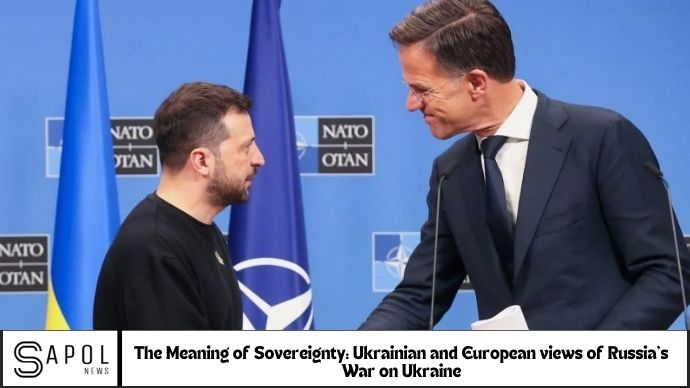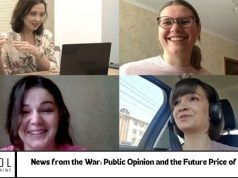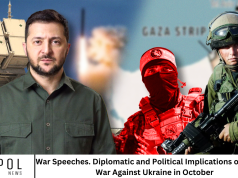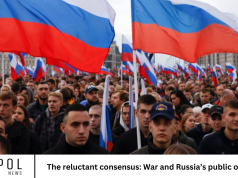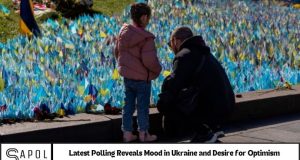The Meaning of Sovereignty: Ukrainian and European views of Russia’s War on Ukraine The first half of 2024 proved to be a challenging period for Ukraine and its Western allies. In the U.S., a delay in the approval of the support package for Kyiv led to a shortage of ammunition on the frontlines. As a result, Russia gained an upper hand by outshelling Ukraine, destroying half of its electricity generation capacity, and reclaiming territory. The outlook for the upcoming winter appeared bleak.
Domestically, Ukraine faced its own set of difficulties. Public discontent rose following the February dismissal of the popular head of the armed forces, Valery Zaluzhny, and the passage of a new mobilization law in April. Meanwhile, in the European Union, a shift to the right in the European Parliament elections empowered several pro-Putin parties, such as France’s National Rally. Adding to the complexity, China and several key countries from the Global South boycotted the June peace summit in Switzerland, signaling the limitations of Western efforts to isolate Russia.
What do citizens across Europe, including Ukraine, think of the war? Have Russia’s military gains impacted the morale of the Ukrainian public? Will Europeans remain supportive of Ukraine amidst their own political crises, including the potential return of Donald Trump to the White House?
To explore these questions, the European Council on Foreign Relations (ECFR) conducted an extensive opinion poll, surveying 19,566 people across 15 countries in early May 2024, just before the European Parliament elections.
The findings offered some reassurance. Despite the dramatic shifts in the war’s trajectory, public opinion has remained largely stable since the beginning of the year. Support for Ukraine has remained steady in the European countries surveyed, and morale in Ukraine is still strong. ECFR’s polling, conducted in Ukraine for the first time, highlights a broad consensus in favor of increasing military aid, particularly weapons and ammunition. This common ground should encourage European leaders to continue supporting Ukraine.
However, beneath the surface, the poll reveals a significant divergence between European and Ukrainian views on how the war will end and the purpose of Europe’s support. While Ukrainians are focused on winning the war with the help of military aid, most Europeans view their support as a means to facilitate a peaceful resolution. This divide also plays out in the public’s attitudes toward Ukraine joining the EU and NATO. Ukrainians largely see membership as a recognition of their sacrifices, while Western leaders often frame it as part of a potential future compromise with Russia. Whether this fundamental difference can be reconciled remains uncertain.
Ukraine’s resilience and political unity have remained strong despite the numerous hardships it has faced. Despite recent territorial losses, widespread infrastructure destruction, and increasing frustration, most Ukrainians continue to place their trust in President Volodymyr Zelensky and the military. While Zelensky’s popularity has slightly dipped, with only 34% of Ukrainians expressing a great deal of trust in him, 31% still have considerable trust. This means that, by a two-to-one margin, those who still support Zelensky outweigh those who do not.
When asked about the war’s likely outcome, Ukrainians remain optimistic: 58% believe Ukraine will win, 30% foresee a negotiated settlement, and only 1% think Russia will prevail. If Western military support increases, optimism rises even further, with 69% of Ukrainians believing in victory and 22% expecting a settlement.
The Ukrainian Perspective on Sovereignty
For Ukrainians, sovereignty is not just a political concept—it is a matter of survival. Since Russia’s invasion in February 2022, Ukraine has fought not only for its land but for its right to self-determination. Sovereignty, in this case, is seen as the core of national identity and freedom.
Key Points:
- Defending National Identity: For many Ukrainians, the fight against Russia is about preserving Ukraine’s independence, language, and culture.
- International Recognition: Sovereignty also means Ukraine’s right to have its borders respected and its government freely chosen by its people.
- Resistance and Resilience: As the war continues, Ukrainians are demonstrating strong resolve in their commitment to protecting their sovereignty, despite the overwhelming odds.
Sovereignty is at the heart of Ukraine’s resistance, as the country faces a powerful neighbor aiming to undermine its autonomy. The war, for many Ukrainians, is a battle for their very existence as a free, independent nation.
The European Perspective on Sovereignty
Europe’s view of sovereignty is also deeply shaped by Russia’s war on Ukraine. For many European countries, the conflict is seen as an assault on the principles of international law and the European security framework. This war challenges not only Ukraine’s sovereignty but also the broader European order.
Key Points:
- Protection of European Values: Europe views the war as a fight for democracy and rule of law against authoritarianism. Russian aggression threatens European unity and the values of freedom that many European countries hold dear.
- Geopolitical Stability: European nations are also concerned about the broader geopolitical implications of Russia’s actions. A destabilized Ukraine could lead to spillover effects in other European countries, further undermining security across the continent.
- Collective Defense: Many European nations see their support for Ukraine as part of a broader commitment to defending not only Ukrainian sovereignty but European sovereignty as a whole.
For Europe, this war is not just about one country’s independence; it is about upholding the international rules-based order that has ensured peace and cooperation in Europe since World War II.
Sovereignty in the Context of Global Politics
The global view of sovereignty in the context of Russia’s war on Ukraine is complex. While the international community, particularly in Europe and the U.S., has largely supported Ukraine’s right to self-determination, Russia challenges this notion. Russia’s claims of historic ties to Ukraine and the desire to protect Russian-speaking populations in Ukraine are framed as justifications for undermining Ukrainian sovereignty.
However, the principles of sovereignty are enshrined in international law, especially the United Nations Charter, which asserts the right of all nations to territorial integrity and political independence. Russia’s actions violate these fundamental principles, drawing international condemnation and leading to global sanctions against Moscow.
How Sovereignty Shapes International Responses
The concept of sovereignty has played a crucial role in shaping the international response to Russia’s invasion. Sanctions, military support for Ukraine, and diplomatic isolation of Russia are all actions aimed at defending Ukraine’s sovereignty and deterring further violations by Russia.
Key Developments:
- Military Aid: Many nations, especially in Europe and North America, have sent military aid to Ukraine to help it defend its sovereignty.
- Sanctions on Russia: The global community, led by the EU and the U.S., has imposed stringent economic sanctions on Russia, aiming to weaken its military capabilities and limit its access to resources.
- Diplomatic Efforts: Diplomatically, Ukraine has received widespread international recognition as the legitimate government of the country, bolstering its claim to sovereignty on the global stage.
May you also like it:
More Americans want the US to stay the course in Ukraine as long as it takes
IRI Ukraine Poll: Strong Support for Victory, EU, and NATO Membership
Latest Polling Reveals Mood in Ukraine and Desire for Optimism
Conclusion
The war in Ukraine is not just a regional conflict—it is a battle for the fundamental principles of sovereignty and self-determination. For Ukraine, it is an existential fight to preserve its independence. For Europe, it is about defending the values of democracy and maintaining geopolitical stability.
As the war continues, both Ukrainian and European perspectives on sovereignty will remain crucial in shaping the international response and in defining the future of international relations. The outcome of this conflict will have far-reaching consequences for how sovereignty is understood and respected in the global order.
FAQ
1. What is the Ukrainian view of sovereignty in the war with Russia?
For Ukrainians, sovereignty means self-determination, preserving national identity, and protecting territorial integrity against Russia’s aggression.
2. How do Europeans view sovereignty in the context of Russia’s invasion?
Europe sees Russia’s actions as a threat to European values such as democracy and rule of law, and the war challenges European security.
3. Why is sovereignty important to Ukraine?
Sovereignty represents Ukraine’s right to exist as an independent, democratic nation and to protect its borders and freedom from foreign domination.
4. How has Russia justified its invasion of Ukraine?
Russia has argued that it needs to protect Russian-speaking populations in Ukraine and that the country has historical ties to Russia, undermining Ukraine’s sovereignty.
5. What international actions are being taken to defend Ukrainian sovereignty?
The international community, especially the EU and the U.S., has provided military aid, imposed sanctions on Russia, and supported Ukraine’s sovereignty diplomatically.
6. What impact does the war have on global sovereignty?
The war in Ukraine tests the international norms around sovereignty, reinforcing the importance of territorial integrity and the global rule of law.

